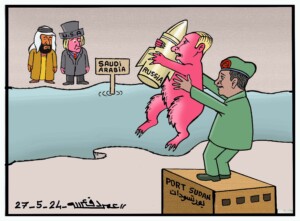Sudan Transparency and Policy Tracker: ‘Next phase of transition make-or-break for a modern, stable state’
Sudan stands today on the threshold of a new phase of its arduous transition to democracy with the imminent signing of a Framework Political Agreement between the October 2021 junta and the political opposition led by Forces of Freedom and Change-Central Committee (FFC-CC). In a brief published this week via the Sudan Transparency and Policy Tracker (STPT), prominent influencer Dr El Shafei Khidir Said calls at this critical juncture, on civilian and military political forces “to treat the next phase of the transition as a make-or-break period on which the hope for a modern, stable state is riding”.

Sudan stands today on the threshold of a new phase of its arduous transition to democracy with the imminent signing of a Framework Political Agreement between the October 2021 junta and the political opposition led by Forces of Freedom and Change-Central Committee (FFC-CC). In a brief published this week via the Sudan Transparency and Policy Tracker (STPT), prominent influencer Dr El Shafei Khidir Said calls at this critical juncture, on civilian and military political forces “to treat the next phase of the transition as a make-or-break period on which the hope for a modern, stable state is riding”.
“The success of the forthcoming transition could guarantee the unity of the country and take it forward into progress and prosperity,” Khidir Said says in the brief entitled Issues in Sudan’s Current Transitional Period – The Challenges of Eliminating the Alliance of Corruption and Tyranny:
Following six months of popular uprising, the Sudanese people overthrew the leaders of the Al Bashir regime in April 2019. That moment crowned three decades of resistance during which many died in torture centres and in theatres of civil war and thousands of political prisoners crowded prisons and “ghost houses.” This was followed by months of continued peaceful protests and fierce repression during which hundreds more were killed and injured to force the military to dissolve a transitional military council that took over following Bashir’s ouster.
The resulting civilian-military “partnership” that was inaugurated in September 2019, with clear demarcations of the full executive powers of the civilian cabinet and symbolic sovereign powers for a collective council chaired by the military as defined in the 2019 transitional charter, was thrown off track from day one. It was hoped that the civilian-led government would carry out the vital tasks needed to move the country forward. However, the military maintained control over the economy and politics of the country from behind the scenes, while the civilian-led cabinet struggled to provide for the needs of the population with control over less than 20 per cent of public resources.
‘The success of the forthcoming transition could guarantee the unity of the country and take it forward into progress and prosperity’
Still, unhappy with the encroachment of macroeconomic reforms introduced by the cabinet on its economic dominance, the military security establishment toppled the untenable cohabitation through the October 25, 2021 coup d’état. The brief emphasises the need for all political forces (civilian and armed) and civil society to treat the next phase of the transition, that a political compromise currently under negotiations between the October junta and civilian opposition could lead to, as a make-or-break period on which the hope for a modern stable state is riding. The success of the forthcoming transition could guarantee the unity of the country and take it forward into progress and prosperity.
The brief addresses the complicated issues of Sudan’s transition, not least defeating ongoing military rule and building a consensus that helps to achieve an agreed transition and facilitate a national dialogue that addresses issues which have been ignored or addressed ad hoc since the country’s independence. In the second part, the paper outlines the priorities for the transition.
Part three examines the challenges facing the transition, part four begins with an acknowledgment that Sudan’s current crisis reflects a historical dilemma of nation building that dates to its independence, part five outlines the priority tasks the next government should address, and part six suggests an economic programme.
Finally, the paper concludes with a call to prioritize overcoming frustration and leveraging the enthusiasm of the masses to meet the current challenges:
The forthcoming (fifth) transitional period in Sudan requires all political forces (both civilian and armed) and civil society to work together to realise the hope of the Sudanese people in building a modern and stable state. Success in carrying out the transition would move the country towards progress, while failure could lead to civil war and the disintegration of the nation.
To date, however, transitional arrangements have been limited to superficial changes and the redistribution of power. Any project for change, such as the one the Sudanese people’s revolution aspires to achieve, that does not promote comprehensive change is doomed to remain illusory.
The current situation in the country may afflict some with frustration and despair that the goals of the revolution will not become a reality, especially those who have been waiting for a long time for change, or who thought that reaping the revolution’s fruits would be immediate. While feelings of frustration and despair are expected and understood, we cannot become completely discouraged. In the end, this serves the interests of counter-revolutionary forces and the henchmen of the former regime.
Therefore, overcoming frustration and stimulating enthusiasm becomes a top priority because organised and conscious enthusiasm can tip the scales in favor of progress. In defending their revolution, Sudanese revolutionary forces are in dire need of enthusiasm, joyful victories, and even of the tears of temporary defeats. This is important to overcome indifference, to raise the banners of hope and sharpen the will to continue moving forward on the path of change until its desired ends are reached.

Disclaimer: The views and opinions expressed in this article are those of the contributing media and/or author and do not necessarily reflect the position of Radio Dabanga.











 and then
and then